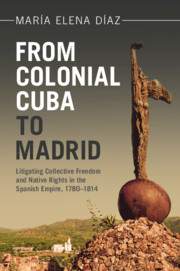 From Colonial Cuba to Madrid
From Colonial Cuba to Madrid Published online by Cambridge University Press: 14 November 2024
Focusing on the relation and conflict between imperial, colonial, and local levels, Chapter 1 lays out the historical context that gave rise to the collective freedom suit. It first traces the process of making law and policy according to the imperial state’s reform imperatives here directed at the privatization and revival of an extractive metal industry based on the once rich copper mines of El Cobre near Santiago de Cuba. Crucial to the production of artillery in the Crown’s arms industry, copper was at the time a strategic resource for the imperial state. But for the beneficiaries of the privatized mining estate, the most valuable resource were the former royal slaves who had long lived in quasi freedom as an unconventional pueblo in the mining jurisdiction. A growing demand for slaves in the colony led to the re-enslavement, removal, and sale of hundreds of cobreros, or natives of El Cobre, thereby upending former local customary practices. A denied offer for a collective self-purchase, or coartación, and land eventually led to a wrongful enslavement action in Madrid. The chapter shows the major impact of imperial Bourbon reforms and of global factors in this so-called hinterland region of empire.
To save this book to your Kindle, first ensure no-reply@cambridge.org is added to your Approved Personal Document E-mail List under your Personal Document Settings on the Manage Your Content and Devices page of your Amazon account. Then enter the ‘name’ part of your Kindle email address below. Find out more about saving to your Kindle.
Note you can select to save to either the @free.kindle.com or @kindle.com variations. ‘@free.kindle.com’ emails are free but can only be saved to your device when it is connected to wi-fi. ‘@kindle.com’ emails can be delivered even when you are not connected to wi-fi, but note that service fees apply.
Find out more about the Kindle Personal Document Service.
To save content items to your account, please confirm that you agree to abide by our usage policies. If this is the first time you use this feature, you will be asked to authorise Cambridge Core to connect with your account. Find out more about saving content to Dropbox.
To save content items to your account, please confirm that you agree to abide by our usage policies. If this is the first time you use this feature, you will be asked to authorise Cambridge Core to connect with your account. Find out more about saving content to Google Drive.